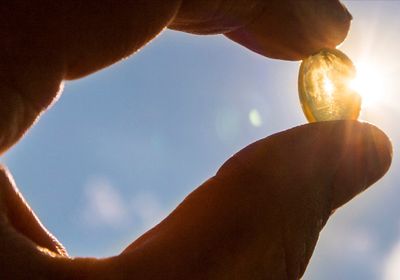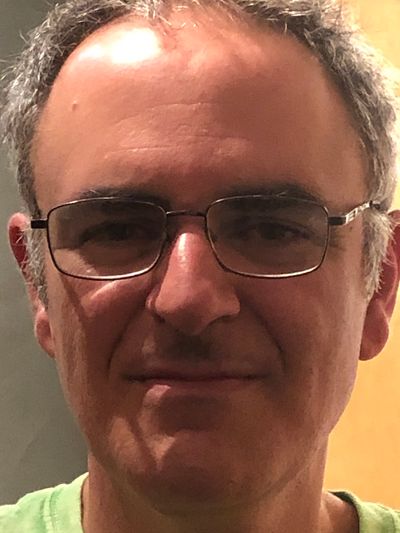ABOVE: Researchers found an unexpected link between vitamin D and the gut microbiome in enhancing anti-cancer immunity in mice. ©istock, Helin Loik-Tomson
Science has many historic examples of accidental discoveries that changed the world. In the modern laboratory, such moments continue to pave the way for scientific advances.
In one such recent occurrence, Caetano Reis e Sousa, an immunologist at The Francis Crick Institute, and his team happened upon a link between vitamin D and cancer through a bacterial ecosystem.1 They found that vitamin D acts through a binding protein, Gc globulin, and the gut resident Bacteroides fragilis to stimulate antitumor immunity in mice. These findings demonstrate for the first time a connection between vitamin D metabolism, a specific species of the microbiome, and the immune response to cancer in a living organism.
“It was pure serendipity, we were not interested in vitamin D,” noted Reis e Sousa, who published the findings in Science.
Vitamin D is best known for its role in bone growth and development, where it facilitates the absorption of calcium, phosphate, and magnesium. More than a century ago, deficiency of this vitamin was identified as the cause of the bone disease rickets. Since then, researchers have found vitamin D to potentially play in a role in a number of other conditions, including cardiovascular diseases, autoimmunity, and cancer.2-4 However, vitamin D does not act alone. Recent evidence suggests that the gut microbiome, located at the interface of the intestinal lumen and epithelia where dietary vitamin D is absorbed, works synergistically with this vitamin to modulate the immune system.5
At first, Reis e Sousa’s group was not looking at the microbiome either. An effective response to a foreign invasion depends on the ability of cells to mobilize immediately. The cytoskeletal protein actin is essential for cell mobility, as well as the changes in cell shape that characterize the cellular immune response. When Reis e Sousa and his team investigated the secreted form of the actin-severing protein gelsolin (sGSN), which is produced by damaged and cancerous cells, they found that lower levels of sGSN expression, or mutations in actin-associated proteins, correlated with enhanced antitumor immunity and increased patient survival.6
“The serendipity comes from the fact that Gc globulin has a separate actin-binding domain and functions as an actin scavenger with secreted gelsolin,” he noted.
The researchers wondered if Gc globulin-deficient mice had similar tumor resistance to what they had observed for sGSN-deficient animals.
In their experiments, the team found that the Gc-deficient mice had enhanced immune-dependent resistance to transplanted tumors as well as a stronger response to immune checkpoint inhibitors. They then noticed that mice not deficient for Gc acquired this tumor resistance when co-housed with Gc-deficient mice, raising the possibility that this resistance depended on the mice’s gut microbiome. Next, they wanted to confirm this hypothesis experimentally. “We were worried that it could just be our mice, so we did fecal transplants from mice fed with high vitamin D into wild type mice from different sources and at two locations,” said Reis e Sousa. “It was like a detective story.”
The fecal transplant experiment confirmed that the tumor resistance was transmissible. The team also observed that treating the Gc-deficient mice with antibiotics diminished their tumor resistance following fecal transplant, further implicating the gut microbiome. They found that this resistance was enhanced when they fed the mice a high-vitamin D diet. The fact that they did not observe this effect in mice with deficiencies in other immunity-related genes that underwent the same treatments validated Gc as the protein linking vitamin D metabolism with the gut microbiome.
Next, Reis e Sousa and his colleagues zeroed in on which microbiome species might confer this resistance. Shotgun metagenomic analysis revealed that one species, B. fragilis, was marginally elevated in the fecal samples from mice on a high vitamin D diet. When the team administered B. fragilis to the mice orally, they noted tumor immunity in mice on a standard vitamin D diet, but not in those on a vitamin D deficient diet. “[B. fragilis] is a candidate as it can phenocopy the effects. But it might work with other microbes, and we need to repeat the experiment in germ-free mice to assess whether other species are involved,” said Reis e Sousa.
By analyzing The Cancer Genome Atlas and a large Danish patient dataset, the researchers found evidence to support their findings on vitamin D boosting cancer immunity. But Reis e Sousa emphasized that their work should not be interpreted as a recommendation to supplement with vitamin D. “Much more work is required to fully assess the relevance of these findings for human health.”
“The novelty of this study is not so much that vitamin D regulates the immune response or has a role in cancer. It has not yet been reported mechanistically how vitamin D does this,” said Alessio Fasano, a gastroenterologist and nutritionist at Harvard Medical School, who was not involved in this study. “This article shows how this happens by using both animal models and a human study, and that is why it is so significant.”
Fasano noted, "It still needs to be captured by clinical trials, but there is applicability of their findings in that vitamin D could be included in cancer treatment and vitamin D levels reported over time…There is new respect for vitamin D.”
References
1. Giampazolias E, et al. Vitamin D regulates microbiome-dependent cancer immunity. Science. 2024;384(6694):428–437.
2. Carbone F, et al. Vitamin D in atherosclerosis and cardiovascular events. Eur Heart J. 2023;44(23):2078–2094.
3. Johnson CR, Thacher TD. Vitamin D: Immune function, inflammation, infections and auto-immunity. Paediatr Int Child Health. 2023;43(4):29-39.
4. Kanno K, et al. Effect of vitamin D supplements on relapse or death in a p53-immunoreactive subgroup with digestive tract cancer: Post hoc analysis of the AMATERASU randomized clinical trial. JAMA Netw Open. 2023;6(8):e2328886.
5. Yamamoto EA, Jorgenson TN. Relationships between vitamin D, gut microbiome, and systemic autoimmunity. Front Immunol. 2019;10:3141.
6. Giampazolias E, et al. Secreted gelsolin inhibits DNGR-1-dependent cross-presentation and cancer immunity. Cell. 2021;184(15):4016–4031.e22.




